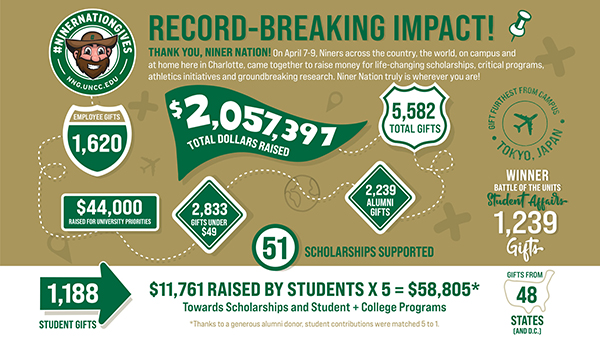Two Exhibits Explore April 30 Memorial Collection
By Katie Howell, University Archivist
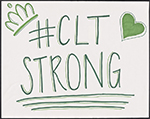 In the wake of the tragic shooting on April 30, 2019 students, staff, faculty, and members of the larger Charlotte community gathered together to mourn for Reed Parlier and Riley Howell. Impromptu memorials at the Kennedy building and the Miner statue were filled with hundreds of candles, flowers, letters of condolence, and other mementos of our collective grief and sadness. When poor weather threatened to destroy these sites, staff members with Atkins Library Special Collections and University Archives stepped in to protect these remembrances from damage. As a result, the items left at the memorial sites have a new home in the archives as part of the UNC Charlotte April 30 Tragedy Memorial Collection.
In the wake of the tragic shooting on April 30, 2019 students, staff, faculty, and members of the larger Charlotte community gathered together to mourn for Reed Parlier and Riley Howell. Impromptu memorials at the Kennedy building and the Miner statue were filled with hundreds of candles, flowers, letters of condolence, and other mementos of our collective grief and sadness. When poor weather threatened to destroy these sites, staff members with Atkins Library Special Collections and University Archives stepped in to protect these remembrances from damage. As a result, the items left at the memorial sites have a new home in the archives as part of the UNC Charlotte April 30 Tragedy Memorial Collection.
This year we mark the second anniversary of the events of April 30. In remembrance, University Archives created two exhibits to share the remembrances with the UNC Charlotte community. Visitors to the Popp Martin Student Union who enter the Student Union Art Gallery will view candles, posters, and cards from the memorials. They can watch video clips of the vigil and news conferences and can hear numerous oral histories conducted with first responders, administrators, and students. The month-long exhibit explores the ways in which UNC Charlotte, the City of Charlotte, and the nation grieved together in the days following the tragedy. The exhibit also highlights the resilience of our campus community and the ways in which we will always remember those who were lost and forever changed that day. Visit the exhibit from April 30-May 28, 2021.
In the Niners Remember April 30 permanent online exhibit, all are invited to view photos, video, and audio recordings made in the days, weeks, and months after April 30th. The online exhibit highlights the May 1 vigil, the numerous memorials made to honor Reed and Riley, and the ways in which the Charlotte community reached out in support of the University.
The Move is Complete!
 After months of planning and careful execution, UNC Charlotte has moved most of the periodicals collection and 70% of the print collection from Atkins Library to an offsite storage facility located 15 minutes from campus in Concord. Materials that remain in the library include popular reading, reference, Curriculum Instruction Materials Center (CMIC), faculty publications, government documents, microforms, DVDs, musical scores, maps, oversized materials, and Special Collections and University Archives. The remaining monographs have been moved to the ground floor compact shelving. Patrons can browse the library’s book collection through the virtual browse feature in our catalog including print books on and offsite along with our extensive ebook collection.
After months of planning and careful execution, UNC Charlotte has moved most of the periodicals collection and 70% of the print collection from Atkins Library to an offsite storage facility located 15 minutes from campus in Concord. Materials that remain in the library include popular reading, reference, Curriculum Instruction Materials Center (CMIC), faculty publications, government documents, microforms, DVDs, musical scores, maps, oversized materials, and Special Collections and University Archives. The remaining monographs have been moved to the ground floor compact shelving. Patrons can browse the library’s book collection through the virtual browse feature in our catalog including print books on and offsite along with our extensive ebook collection. 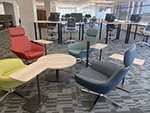
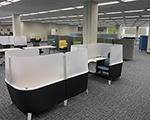
In the short term with COVID-19, Atkins needed to provide additional social-distanced seating in the library. In the long term, the library needed to provide more study and collaboration seating (2,500 additional seats) for students. Now, the 2nd and 3rd floors have been renovated with bright new paint and carpeting and are filled with a variety of new furnishings for both individual and collaborative study. Tables and chairs formerly in those areas have been moved to the tower floors.
“Atkins Library is the hub of research, learning, and innovation on the UNC Charlotte Campus, and provides essential space for students to collaborate, study, explore, and create,” said Dr. Jay Raja, Senior Associate Provost of UNC Charlotte, when the move was first announced. “Between our growing enrollment and the strain of social distancing due to the pandemic, moving these materials to the storage location helps ensure that students have the resources and academic space they need to be successful. The move follows a national trend in academic libraries to devote additional space to student collaboration and interaction.”
Donor Sought for TJ Reddy Painting
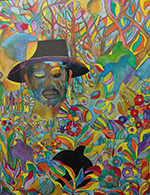 A self-portrait painted by one of the University’s most cherished and accomplished alumni is currently on loan to the University, and the Library is seeking one or more donors to purchase it for the University art collection.
A self-portrait painted by one of the University’s most cherished and accomplished alumni is currently on loan to the University, and the Library is seeking one or more donors to purchase it for the University art collection.
The piece, “Blues Man,” is a 1987 acrylic painting by T.J. Reddy. It is described by its owner as a “Self-portrait evoking social realism and cultural themes including the symbolic doves and fish woven throughout the painting. Bold and bright colors are inspired by his Caribbean experiences.”
As many know, Reddy is one of the most beloved and accomplished alumni in UNC Charlotte history. As a student here in the late 1960s, he helped to found the Black Student Union and the Black Studies program (now the Africana Studies department). A civil rights activist, he was falsely imprisoned in 1972 as a member of the “Charlotte Three” until his sentence was commuted by Gov. Jim Hunt in 1979. Afterward, he had a distinguished career as an artist, poet, and musician.
Reddy passed away on March 31, 2019, but he is still with us in art and memory. An artist who frequently gave back to the community through his work with children, he was recently identified by the Charlotte-Mecklenburg Schools as among three potential namesakes for an academic center. However, it was later determined his death was too recent for him to be considered.
For security reasons, ”Blues Man” is not on public display. To arrange a viewing or for further information, please contact Dawn Schmitz, Associate Dean for Special Collections and University Archives. dawn.schmitz@uncc.edu or 704-687-1674.
Keeping Students Engaged During the Pandemic
By Natalie Ornat and Jordan Murphy
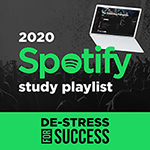 Formed in fall 2019, Atkins Library’s Student Engagement Committee plans student-centered activities and offers students new ways to engage with the library. Before the pandemic, we regularly engaged students with fun questions and prompts at our whiteboard wall for students to contribute to and read when first entering the library. Students might share the music they are listening to, shows they are binge watching or their favorite study snacks. Transfer students were asked to share from which schools they transferred. During Black History Month 2020, we asked students to write down the name of someone from the Black community who inspires them, creating a positive and supportive spot for our library users that day.
Formed in fall 2019, Atkins Library’s Student Engagement Committee plans student-centered activities and offers students new ways to engage with the library. Before the pandemic, we regularly engaged students with fun questions and prompts at our whiteboard wall for students to contribute to and read when first entering the library. Students might share the music they are listening to, shows they are binge watching or their favorite study snacks. Transfer students were asked to share from which schools they transferred. During Black History Month 2020, we asked students to write down the name of someone from the Black community who inspires them, creating a positive and supportive spot for our library users that day.
When the pandemic hit and we entered an uncertain period of toilet paper shortages and local lockdowns, we immediately shifted our approach to engagement. Our goal was to keep students interacting and engaged with Atkins, even though we could not physically be together. We experimented with various virtual forms of interaction, such as posting our whiteboard-style questions on Instagram stories, using Padlets, and hosting Makerspace craft tutorials on Zoom. In the fall, we found some success with hosting live events over Zoom, such as a virtual voter registration drive and panel celebrating campus activism called 49ers Make Good Trouble.
As exam week approached, we worked to identify our most successful De-Stress for Success programs and ways to transition them online. Prior to the pandemic, De-Stress for Success was a way for us to take one of the most stressful periods in the semester, finals week, and offer relaxing study breaks to help students push through.
We identified our therapy dog program and Recharge Room as two activities we could translate to a remote environment. Our therapy dog program, better known as Paws for Exam Therapy, provides critical exam support and is something we all -- students and staff -- appreciate and look forward to every year. While we couldn’t allow people to gather to actually pet our pups in person, we shared photos and videos of our furry friends on social media as a way to brighten peoples' days. Another exam favorite was our Atkins Recharge Room, which shifted to become a virtual space with a stress-busting activity guide filled with resources and study break materials all in one place. The Virtual Recharge Room is now a permanent tab on our New Student Resources guide, which allows you to explore much of what the library has to offer from anywhere. The combination of Zoom fatigue and wanting to be flexible and considerate of students’ schedules lead to this focus of providing online content that is available 24/7 for students to consult at their individual point of need.
The New Norm era has radically changed our means of engagement. Especially as a newer committee, this unusual time has truly made us appreciate the reciprocal relationship we have with students of Niner Nation. By maintaining connections and finding new ways to engage with students over such a challenging and, for many, lonely time, the library serves as a critical piece of the student support system.
Digital Primary Sources Enhance Online Instruction
By Randi Beem, Instruction Librarian/Archivist
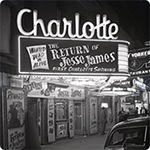 Special Collections and University Archives (SCUA) is where faculty find primary, or original, sources of information about topics they are teaching or researching. A primary source is an artifact, document, diary, manuscript, autobiography, recording, or any other source of information that was created at the time under study.
Special Collections and University Archives (SCUA) is where faculty find primary, or original, sources of information about topics they are teaching or researching. A primary source is an artifact, document, diary, manuscript, autobiography, recording, or any other source of information that was created at the time under study.
SCUA staff work with faculty on incorporating digital primary source materials into their online instruction, and help to identify what collections are available to students while the in-person classroom experience in the Special Collections Reading Room isn’t accessible (due to Covid-19 restrictions). Digital collections from Goldmine, our digital repository of local cultural heritage collections, have been used in instruction in a number of ways during the past semesters.
One collection used in several courses is the papers of Charlotte’s first African American city council member since the 1890s, Fred D. (Frederick Douglass) Alexander. The collection has been used in courses ranging from an anthropology class focusing on cemetery studies to an architecture course. It highlights one event in Charlotte’s history, the racial segregation of Pinewood/Elmwood Cemetery in the late 1960s. Materials such as constituent letters depicting everyday Charlotteans’ concerns about the integration of the cemetery pull back the veil of this event in Charlotte’s history.
Another collection used in various courses is the Charlotte College Photographs, which cover the early history of the University from 1950 to 1970. Students are always interested in the history of UNC Charlotte, and these photographs are a great way to give students of different disciplines a glimpse into the history of the campus. This collection has been used in disciplines including architecture, liberal studies, first-year seminars, and history through engaging active-learning activities.
For faculty who want to incorporate a human element into their course, our Oral History collections may offer helpful digital resources. These Interviews highlight a range of topics in Charlotte including the LGBTQ community, environmental activism, and student activism. Various sets of interviews have been used in history classes focused on student activism and Southern Studies. These interviews bring history to life for students in a way that is similar to a podcast.
The collections highlighted here are but a small sample of what you can find by digging in Goldmine.
Atkins Library Thanks You!
We appreciate everyone who participated in the University’s 49 hours of Niner Nation Gives in early April. UNC Charlotte exceeded its goal with a record-breaking total of $2,057,397. Thanks to you, Atkins Library received 84 Gifts for a total of $21,021! Dr. Peter and Ashley Larkin generously contributed $12,500 in response to your overwhelming support of 49 gifts! Thanks as well to alumnus Kiyoshi Takai, class of 2001, for being the farthest donor away to support #NinerNationGives! From Tokyo, Japan, his gift unlocked an additional $500 for the Atkins Library Study Room Renovation Fund. Niner Nation truly is wherever you are!
